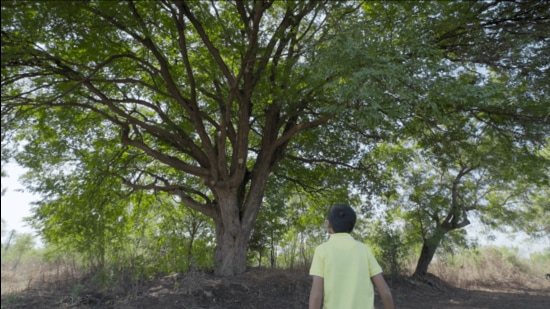
Short Stream | In Vinchurniche Gandhi, a look into the life of a climate visionary
4 months ago | 35 Views
About 7 km from Maharashtra’s Phaltan tehsil in the biodiverse Satara district is a village named Vinchurni. It has lush forest cover over a green expanse of 120 acres. Its rich biodiversity includes a variety of insects, trees, animals such as hyenas and peacocks, medicinal plants such as gugul, ponds, water streams, and regular crops and fruits in seasonal cycles.
This is a man-made forest. Babulal Gandhi, 96, and his younger brother Maganlal Gandhi, who is no more, created this green zone in one of Maharashtra’s well-documented “rain shadow” zones — A rain shadow is a patch of land that has become a desert because mountain ranges have blocked all plant-friendly rainy weather. On one side of the mountain, wet weather systems drop rain and snow. On the other side of the mountain — the rain shadow side — all that precipitation is blocked.
Gandhi was born and raised in this area before he joined Vinoba Bhave’s ‘Bhoodan Movement’ or the land donation movement of the 1950s. The movement began in 1951 in the village of Gandhian Bhave in his village in Pochampally, Tamil Nadu. It soon became a nationwide movement. The Bhoodan movement made an effort to convince rich landowners to voluntarily donate a portion of their property to others who were without land. As a young man, Gandhi travelled to Bihar and Uttar Pradesh and witnessed work and livelihood on donated land.
The land of his childhood wasn’t very fertile. It was in a rain shadow. But he and his brother made a resolve and in over a decade, transformed Vinchurni to a green, fertile, water-rich oasis. One of the methods they employed was zero contours farming or terracing wherein at each level of graded land, water would flow with halts, allowing dirt to settle at the bottom and water to absorb well in every level of the land.
When Pune-based sustainable food entrepreneur Seema Agarwal interacted with Vinchurni’s residents and farmers — most of the cultivation in this farm is done by the daughters of the extended Gandhi family, who Gandhi trained and equipped for natural, toxin-free farming — to source produce for her business, she was surprised by the nonagenarian’s infectious advocacy and practice of farming that supports the precedence of “jal, jameen and jungle” in any kind of life or livelihood.
“The thing that struck me again and again about Babukaka is that he is always willing to give away what he has. He truly believes that the land and the forest and what it gives us can’t be monopolised. It is a radical thought, one that resonates more with today’s children than with us from another generation,” Agarwal said.
Agarwal approached Harish Tarun who runs Aproop Films, a filmmaker who has been interested in socially-engaged subjects for a long time before that, having written and directed two Marathi short films before Vinchurniche Gandhi. Both were set in rural Maharashtra; one was about a woman who doesn’t have a toilet inside her home and another on the effects of chemical fertilisers on the human body.
“Over five days we shot this film, with just a 10-15 members crew. We depended a lot on serendipity and improvisation.” Schools in Pune undertake regular trips to “Babukaka’s farm” to learn about sustainable living and farming, and Tarun and his team decided to do the shoot during one of those trips when a bus full of city schoolchildren was visiting the farm.
The story unfolds through the viewpoints of a boy of about 10. He marvels at what he sees and hears — from trees that are so big it takes him and his friends some effort to hug them, water bodies always in motion, birdsong and delicious food made with produce from the farm. The documentary has a voiceover narration by a child from Pune who cherishes his trip to this green oasis — and the narrator sounds almost like someone who is following in the footsteps of a climate warrior.
The star of the film is Babulal Kaka himself: At 96, he is sharp, wrestling long-term and short-term memory with ease and a sense of humour, always up for a walk in the forest, always full of stories and practical tips to implement. It is a man completely attuned with the ways of nature — and that makes this biopic of him and the forest he built, not only inspirational but extremely relevant to the generation becoming adults in a few years.
“Just as air, water and light belong to everyone, so does land. Our focus should be on water, land and forest,” Gandhi said, taking his audience through his years of devotion to nature. His ikigai is aspirational today in this wellness-obsessed world, and his longevity, effortless to him and those who have witnessed him live and work, is a potential subject of biological research.
Short Stream is a monthly curated section, in which we present an Indian film that hasn’t been seen before or not widely seen before but is making the right buzz in the film industry and film festival circles. We stream the film for a month on HT Premium, the subscription-only section on hindustantimes.com.
Read Also: Creative ways to add charm and character to your kitchen, incorporating unique features
#




















